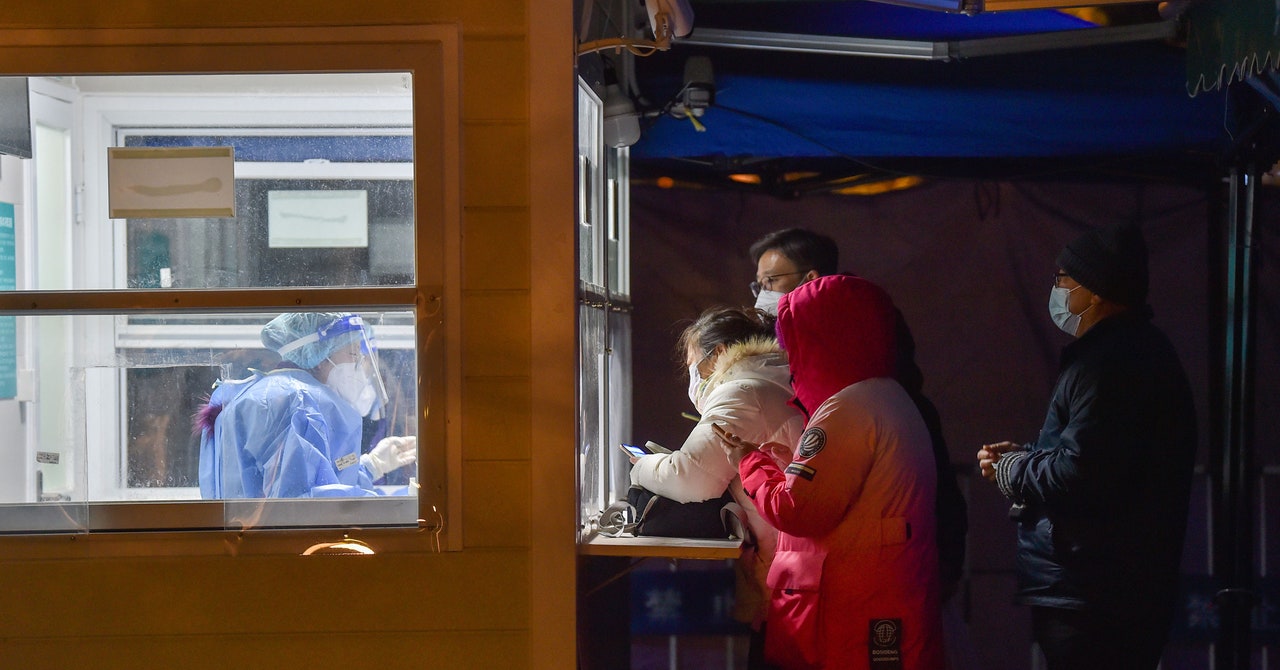
The fear is that the sudden spread of Covid through a new population with relatively little prior exposure to the virus will lead to the emergence of a new “supervariant”—one that has the potential to change the face of the pandemic like the Alpha, Delta, and Omicron forms of the virus did before. But whether there’s a significant risk of this happening isn’t clear.
In 2020, Ravi Gupta, a professor of clinical microbiology at the University of Cambridge, published a paper in the journal Nature demonstrating that chronic SARS-CoV-2 infections—where the virus lingers and multiplies inside the body of someone whose immune system is compromised—provide the virus with a greater opportunity to evolve. “A billion new infections means more opportunity for more chronic infections,” says Gupta. “You’re upping the numbers game in favor of the virus to make new, potentially problematic variants.”
But Cowling argues that because the level of immunity is much lower in China than the rest of the world, it will be relatively easy for the virus to spread through the population without needing to evolve. He says that if a new supervariant were to emerge, it might be more likely to come from North America or Europe, where more people have built up immunity through both vaccination and prior infection.
“My gut instinct is that the risk of a major new variant is probably not higher in China,” Gupta says. “In the UK, for example, if Covid is going to continue circulating, it’s got to find a new direction and way around the immunity from previous waves of Omicron and all its subvariants, whereas in China it’s quite happily spreading anyway.”
Even if a new supervariant does appear, scientists are unsure whether it would be more or less virulent than what’s already out there. Last year, Gupta and his colleagues showed that Omicron is less lethal than its predecessors because it does not infect lung cells as efficiently. “Instead it infects nasal cells,” he says. “Omicron chose a pathway that exists in the upper airways, so it’s less severe and transmits very, very well.”
But Gupta cautions that this doesn’t necessarily mean that the whole trajectory of the virus has shifted to being less severe, and says it is still biologically plausible for an immune-evasive version to emerge that is more virulent. “There’s no evolutionary reason why the virus couldn’t go back to being quite pathogenic,” he says.
Whatever happens, it’s possible that it will take some time before the full consequences of China’s Covid surge becomes apparent. While some global consortiums such as GISAID in Germany are still dedicated to tracking coronavirus mutations, in general, countries around the world have scaled down their efforts to sequence viral samples, making it harder to track new variants and how they are being introduced to different countries. “People have realized how much it costs, and it’s not just in the UK and the US—it’s happened globally,” says Gupta. “So for that reason, we are maybe at our most vulnerable at the moment, in a relative sense, just because we don’t know what’s out there.”
For much of Europe and North America, Balloux describes Covid as currently being comparable to many other common respiratory infections, although that picture could change if a dangerous new supervariant were to emerge. The alarming spikes of cases, hospitalizations, and deaths of 2020 and 2021 have been replaced by a steady, more insidious death toll.
Between January and November 2022, 41,620 people in England perished from Covid. Most are believed to have been elderly people who were already frail and suffering from multiple underlying health conditions, or people whose immune systems were suppressed—either because of illness or medicines they were taking—though no precise data exists. In comparison, a particularly severe flu season tends to result in around 30,000 fatalities.
“There are very few young healthy people who die from Covid now in the UK or the US,” says Balloux. “What Covid does at the moment is essentially add to the stress of other issues—people who already have underlying problems, and the fact that in the UK, the hospital system can’t cope. It’s amplifying these underlying risks.” China’s Covid surge, at least for now, will do little to change this already-existing threat that the virus poses.


